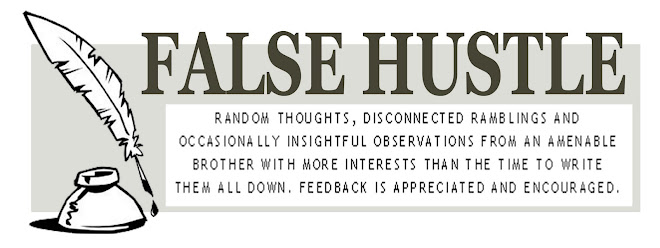Not really.
But I'm much more inclined to side with Ross Douthat than Ta-Nehisi Coates in this respectful debate about the relative importance of the nuclear family model and protecting the public good. Pardon me if I've covered this ground before.
First, TNC:
As much as I can recall, there were basically three reasons for us to get married. 1.) I might leave. Marriage would force me to do the right thing. 2.) To declare our commitment to each other before a community of people whom we loved. 3.) The business reasons--the legalities of your estate and guardianship. I found--and still find--the first two reasons were utterly unconvincing. The third held some sway, but with the help of a lawyer we've managed to take care of that. The first turned marriage into a kind of insurance policy, and I just believed that if you felt you needed insurance for the person you were having kids by to stick out, you needed to reconsider the whole proposition. The commitment and community reason held some appeal. But I believed, and still believe, that long-term romantic partnerships are between the two people entering into it.
I hated the idea of public declarations, because the life blood of the relationship--what bills to pay, how to raise your child, your love life--all of that happened when no one else was around.
Now for Ross:
Yes, the best relationships shouldn't need institutional hedges against infidelity and/or abandonment. But an awful lot of relationships worth fighting for do end up benefiting from being hedged around with institutional supports - because life is long, people are complicated, and you don't always know when you're starting out what you'll need to reach the end of the road together. Yes, relationships are about the two people involved far more than they're about anybody else. But that doesn't mean that they aren't also about the community, particularly when kids are involved. The private is central and essential, but it still spills over into the public; your relationship is about you and your partner, but it's also, inevitably, about your friends and neighbors as well.
And these two points go hand in hand. When people don't do the right thing, whether by their partner or more importantly by their kids, it's by definition a problem for the community, because it's the community that's left to pick up the pieces. Which is why it makes sense for your community to ask you for a public commitment when you set out to rear a family, whether you think that you and the mother/father of your child needs such a thing or not. You may be sure that you're in the kind of relationship that won't benefit from an institutional commitment, but the community doesn't know that: It just knows that in the aggregate, public commitments tend to be stronger than private ones - and thus better for parents, for children, and for society writ large. So a community that asks for public commitments isn't disrespecting your potential exceptionalism; it's just asking you to respect the aggregate, and to set an example for the people who might not be as exceptional as you.
... most people aren't exceptional. ... And that's why norms matter, why institutions matter - and sometimes why stigmas matter as well.
Ross is right: in the aggregate, marriage is better for kids than single parenthood; better for men and women than long-term cohabitation; and better in a general sense as far as health, finances and general social well-being.
No doubt, I think people should do what they feel - especially in the privacy of their own homes and bedrooms - as long as their pursuit of freedom, love and happiness doesn't in any way infringe upon mine. And that's where this issue gets tricky.
Individual breakdowns in social norms may not pose much hazard or stress for you, yours and your exceptional situation but, on a macro level, that will cause trouble in most other neighborhoods. We know that broken families and their offspring generally make up the bottom strata of most socioeconomic indicators.
We also know that life generally does not unfold according to plan: loved ones stray, condoms break, promises of a lifetime of companionship are broken. The nuclear family should not be a mandate but more of a goal.
People should feel free to be a great single mom or a responsible father with weekend visitation rights or to make private promises rather than public declarations to their bethroed. I wouldn't want to take that right away. I wouldn't even bother with judging you - I've got a lot of life yet to live, you know?
But most importantly, I don't have a problem with public declarations. And if we're to ensure that those whom aren't so exceptional don't leave it to those whom are exceptional to pick up the pieces, we need some sort of social construct to assure that private failings don't become public problems.
Ross can close it out:
When people don't do the right thing, whether by their partner or more importantly by their kids, it's by definition a problem for the community, because it's the community that's left to pick up the pieces. Which is why it makes sense for your community to ask you for a public commitment when you set out to rear a family, whether you think that you and the mother/father of your child needs such a thing or not.
Continue Reading »
 In response to Mr. Andrea Mitchell's reference to the "unquestioned value" of promoting homeownership, Atrios pretty much sums up the way I feel about the issue:
In response to Mr. Andrea Mitchell's reference to the "unquestioned value" of promoting homeownership, Atrios pretty much sums up the way I feel about the issue:.jpg)
